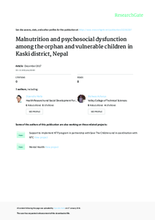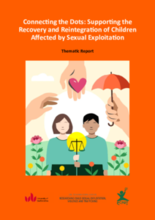This country page features an interactive, icon-based data dashboard providing a national-level overview of the status of children’s care and care reform efforts (a “Country Care Snapshot”), along with a list of resources and organizations in the country.
demographic_data
childrens_living_arrangement
children_living_without_bio
adoption
social_work_force
key_stakeholders
Key Stakeholders
Add New DataOther Relevant Reforms
Add New Datadrivers_of_institutionalisation
Drivers of Institutionaliziation
Add New Datakey_research_and_information
Key Data Sources
Add New DataAct Relating to Children 2018 - Nepal
Trafficking in Persons Report June 2018
Country Care Review: Nepal
Acknowledgements
Data for this country care snapshot was contributed by Forget Me Not and UNICEF Nepal.
Displaying 51 - 60 of 140
UNICEF is seeking a Child Protection Specialist in Nepal.
In this webinar, Yashoda Upreti from Terre des hommes Foundation (Tdh), RISE member in Nepal, will share how the organization uses case management to provide a transparent monitoring and quality control system that facilitates a process to sustain actions to promote child protection, relying on teamwork and a strong child-centered approach.
UNICEF is seeking a Knowledge Management Consultant for Child Protection, Child Marriage and Disability in Nepal.
UNICEF is seeking a Knowledge Management Consultant for Child Protection, Child Marriage and Disability.
The objective of this study was to assess malnutrition and psychosocial dysfunction among vulnerable children as well as to determine the association between malnutrition and psychosocial dysfunction among orphan and vulnerable children in Kaski district, Nepal.
This study examined the prevalence of child maltreatment as measured by the level of physical (moderate to severe) and emotional abuse and child labor, and the associated household level determinants of child maltreatment in Nepal.
This BBC 100 Women video features Indira Ranamagar, who ensures Nepali children whose mothers are incarcerated receive safe homes, care and education.
In this video, Kate van Doore describes the process of 'paper orphaning,' a term coined to characterize how children are recruited and trafficked into orphanages to gain profits through international funding and orphanage tourism.
Many children living in Nepalese orphanages are not truly "orphans," but were rather trafficked into orphanages after their families were falsely promised their children would be brought to boarding schools to receive an education. Next Generation Nepal aims to reunite trafficked children with their families.
This report starts to collate evidence on what appears to be important to children who have experienced sexual exploitation.


